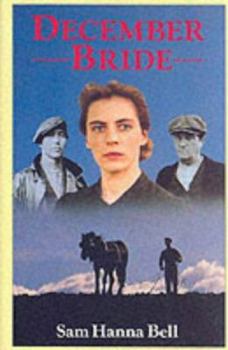December Bride
Select Format
Select Condition 
Book Overview
A classic Irish novel about a servant girl who bears a child to one of two brothers but will not reveal which one. This description may be from another edition of this product.
Format:Paperback
Language:English
ISBN:0856400610
ISBN13:9780856400612
Release Date:January 1997
Publisher:Blackstaff Press
Length:304 Pages
Weight:0.65 lbs.
Customer Reviews
1 rating
A Northern Irish classic of love, lust, loathing + the land.
Published by Thriftbooks.com User , 22 years ago
'December Bride' begins grimly with a wedding between two middle-aged farmfolk in an empty church. Outside, a curious band of onlookers lurk in the cemetary. In this opening sequence, the novel's Big Themes are set up - The Land, Family, Death, Religion, Community. Bell than switches back a quarter of a century to chart how this scanario came to be. Andrew Echlin, benevolent patriarch of a large lake-side farmstead in turn-of-the-20th-century Northern Ireland, widower father of two sons (silent Hamilton and impetuous Frank), hires labouring tenant Martha Gomartin and her 30-year-old daughter Sarah as domestic servants. After Andrew's death in a boating accident, both men enjoy Sarah's favours, producing a baby of uncertain parentage. Despite the ineffectual efforts of a disapproving clergy, and the scandalised hostility of the community, Sarah refuses to marry either brother, and effectively takes over the running of the household. This menage-a-trois is seen as a direct affront to Puritan Protestant Ulster values; as minister Sorleyson muses: 'One had obligations to one's fellow-men. Of what avail was virtue if lust and irresponsibility were to be crowned with contentment?'Bell uses as an epigraph a verse by Thomas Hardy, and it is to the latter's novels that 'Bride' bears most resemblance, with its focus on austere agricultural life, on the influence of the weather and the land on characters, on the confict between the eternal cycle of the seasons and the brutal transience of individual lives. Dialect (in this case Ulster-Scots) is richly employed, both in dialogue and in the detailed descriptons of farming life; the transgressive behaviour of individuals and families are contrasted with the norms of the wider community. As in Hardy, Bell favours dramatic set-pieces, often self-contained; he is also alert to the shifting emotions and contradictions of characters. Although the book's pleasures pertain to the 19th century novel, the writing is tauter; 'Bride' is ultimately not as relentlessly bleak or fatalistic as Hardy, despite that opening scene, the brooding or portentous atmosphere of many sequences, and the shattering violence or accidents that break out.'Bride' is a canonical text in Irish literature, looked at for insight into the bitter history of Northern Ireland and the 'Ulster mentality', with the Troubles breaking out less then two decades after its publication (1951). And it is true that the tensions between Protestants and Catholics are a feature, that the issue of land and its control is crucial, that events seem to take place around important historical dates. But to reduce this novel to its academia-friendly bones not only misses the subversive, non-nationalist narrative of a servant girl and her disruptive sexuality taking control of a powerful farmstead, but also minimises Bell's gifts as a novelist, his psychological acuity, the visual and verbal poetry of his scene-setting, and the power of extended sequences, s






